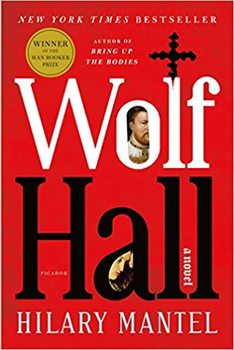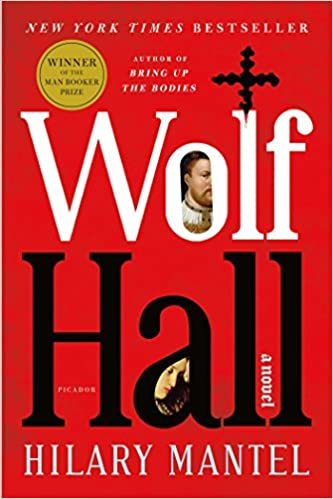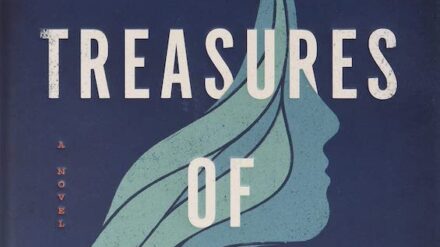
Five hundred years ago England was taking its first, tentative steps into modernity. At a time of religious and political conflict, the middle class was growing, literacy spreading, and the country’s government was staggering toward parliamentary democracy as the king came to depend more and more on tax revenues that only Parliament could levy. In this turbulent setting, a blacksmith’s son and former soldier of fortune named Thomas Cromwell steadily made his way past the cul-de-sacs of power in the royal court to become the most powerful lord in the realm. With a brilliant and cunning mind, a prodigious memory, and great charm, he rose to become the king’s chief adviser and set the country’s course on a firm new footing independent from Rome. In Wolf Hall, the first book of a trilogy, Booker Prize-winner Hillary Mantel begins his remarkable story. It’s better than any history of the period.
A story that’s better than any history book
This novel encompasses several of the pivotal events that so entrance dramatists and novelists writing about the period.
- Queen Catherine’s rejection by Henry VIII; Rome’s insistence on the sanctity of their marriage, followed by his refusal to accept the Church’s supremacy and his subsequent excommunication.
- Henry’s marriage to the commoner Anne Boleyn, and her accession as Queen of England.
- The fall of Cardinal Wolsey as Lord High Chancellor and his replacement by Sir Thomas More, who was fond of burning “heretics” at the stake; More’s trial and beheading.
- And the steady rise of Thomas Cromwell to greater and greater power.
Had Shakespeare lived another decade and gotten around to writing a history of the period, he would have had a field day. Hillary Mantel certainly did.
Wolf Hall (Wolf Hall Trilogy #1) by Hillary Mantel (2010) 604 pages. Audible Edition narrated by Simon Slater. ★★★★☆
Winner of the Man Booker Prize
What you need to know to understand this story
If you’re not a product of British “public” schools or a history buff steeped in the story of the Tudor monarchs, you might find Wolf Hall rough going. Here’s what you need to know to understand what’s going on in this complex historical novel.
The historical context
England in the 1520s and 30s, when the central events in this novel take place, was wracked by religious and civil conflict. Martin Luther (1483-1546) had posted his 95 Theses in 1517, launching the Protestant Reformation. More and more Britons were heeding the words of the German monk and his followers and reading the Bible.
Less than a century earlier, Johannes Gutenberg had employed movable type for the first time in Europe—and he printed his first Bible around 1450, setting off an avalanche of imitators. As Bibles made their way throughout the German principalities, the Low Countries, and Britain, more and more men (and fewer women) were learning to read. The preachers who spread the Gospel were gaining followers at a rapid clip—and the Church’s reaction was swift and violent. Everywhere, the advocates of Bible-reading faced the danger of being burned at the stake by hysterical Church officials.
Compounding the religious conflict was the legacy of the Wars of the Roses (principally 1455 to 1487), a protracted civil war between the Houses of York and Lancaster to settle the succession to the English throne. The issue was settled at length when Henry Tudor of the Lancastrian line ascended the throne as Henry VII (Henry VIII’s father), united the two warring factions by marrying Elizabeth of York, and founded the Tudor Dynasty.
Thomas Cromwell
Thomas Cromwell (1485-1540), Mantel’s protagonist, was one of the principal actors in the drama of English politics and foreign affairs during the first half of the sixteenth century. Though “low-born” as the son of a blacksmith, he was the principal adviser to King Henry VIII and became more powerful than the nobles in the court. Cromwell is not to be confused with Oliver Cromwell (1599-1658), who for a time a century later was Britain’s dictator. The two men were not related by blood: Oliver was descended from Richard Williams, son of Thomas’ sister, who later was adopted by Thomas and lived in his London home.
King Henry VIII
King Henry VIII (1491-1547) ruled England for nearly forty years (from 1509 until his death). Historians, novelists, and filmmakers alike share a fascination with Henry, in part because he married so many times (six), beheaded two of his wives, broke with Rome to establish the independence of the Anglican Church, and fathered Elizabeth I (1533-1603), the “virgin queen,” one of Britain’s most effective monarchs.
Wolf Hall
Wolf Hall is a curious choice for the title of this book about the life of Thomas Cromwell. There are references to the manor from time to time through the text, but in the early years of the sixteenth century it was an inconsequential place in Wiltshire, seat of the Seymours, one of many noble families warring for influence in that turbulent era. Wolf Hall as it is known to history was financed and built in that spot by Cromwell and Henry VIII in the 1530s when Jane Seymour (1509-37) became the King’s third wife—events that transpired only after those related in the novel, which draws to a close in 1535.
Cardinal Wolsey
Thomas, Cardinal Wolsey (1475-1530) served as Lord Chancellor of England from 1515 to 1529. He was the most powerful man in the kingdom after the King, and one of the richest. Henry deposed him for his failure to persuade the Pope to annul his marriage to Catherine of Aragon (1485-1536), thereby allowing him to marry the much younger Anne Boleyn.
Sir Thomas More
Sir Thomas More (1478-1535), author of the classic novel Utopia, was Lord Chancellor of England from 1529 to 1532. A Catholic who remained loyal to the Pope to his dying day, he was beheaded in 1535 for his refusal to acknowledge King Henry VIII as head of the Church of England. He is recognized by the Catholic Church as a saint.
Anne Boleyn
Anne Boleyn (1507-36) was the second wife of Henry VIII and the mother of Queen Elizabeth I. It was to marry her that the King insisted that his marriage to Catherine be annulled and broke with Rome when the Catholic hierarchy resisted him. Anne was the niece of the powerful Thomas Howard, Duke of Norfolk, and sister of Mary Boleyn, a mistress to King Henry VIII and former mistress of King Francis I of France.
For a guide to several of the other characters who populate Wolf Hall, see the Wikipedia List of The Tudors characters.
About the Audible Edition
When the COVID-19 pandemic forced me and my wife to hole up at home, I found myself taking longer and longer walks, if only to get out of the house. (Masked, of course.) I turned to audiobooks as a way to keep myself occupied while I rambled further and further from my immediate neighborhood. Wolf Hall was the third book I selected, and the first novel. Although Simon Slater’s narration was superb—he even got most of the accents right—I found it a little difficult to keep up with the story.
This novel is, after all, a very complicated account of a pivotal moment in English history. The cast of characters is huge. Had I been reading the book instead of listening to it, I’m sure I would have Googled some of the names I encountered or checked back several chapters to remind myself what some character had done a year or two earlier. The upshot is that I didn’t find the experience to be wholly satisfying. In my limited experience with this format, audiobooks seem to be better suited to short stories and essays. I had a better time listening to books rather than reading them before I got to Wolf Hall.
For related reading
For another widely acclaimed novel set in the same period, see The Other Boleyn Girl (Plantagenet and Tudor Novels #9) by Philippa Gregory (She might have married Henry VIII. Her sister did.)
You might also be interested in:
- 20 most enlightening historical novels
- Top 10 historical mysteries and thrillers
- 20 top nonfiction books about history
And you can always find my most popular reviews, and the most recent ones, on the Home Page.

























